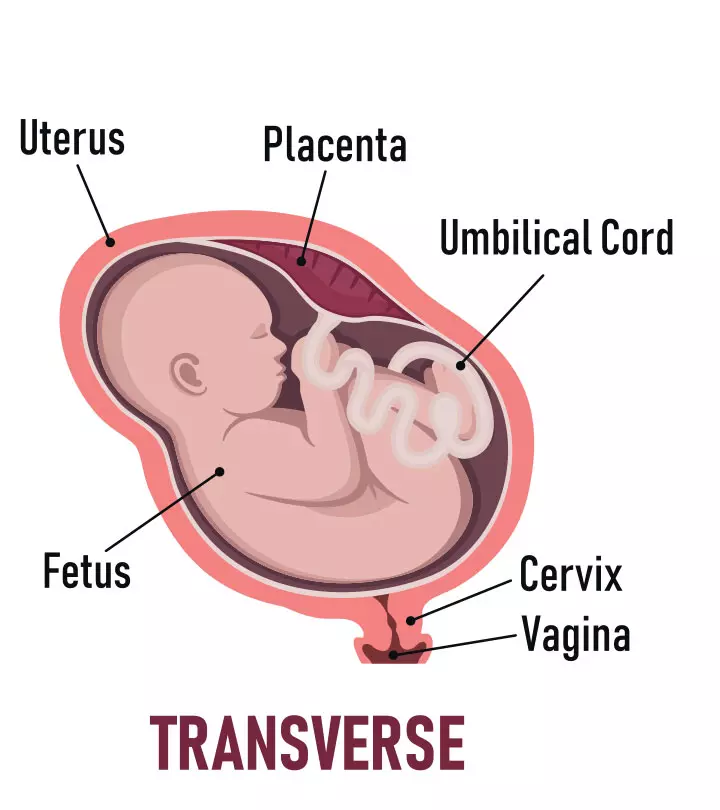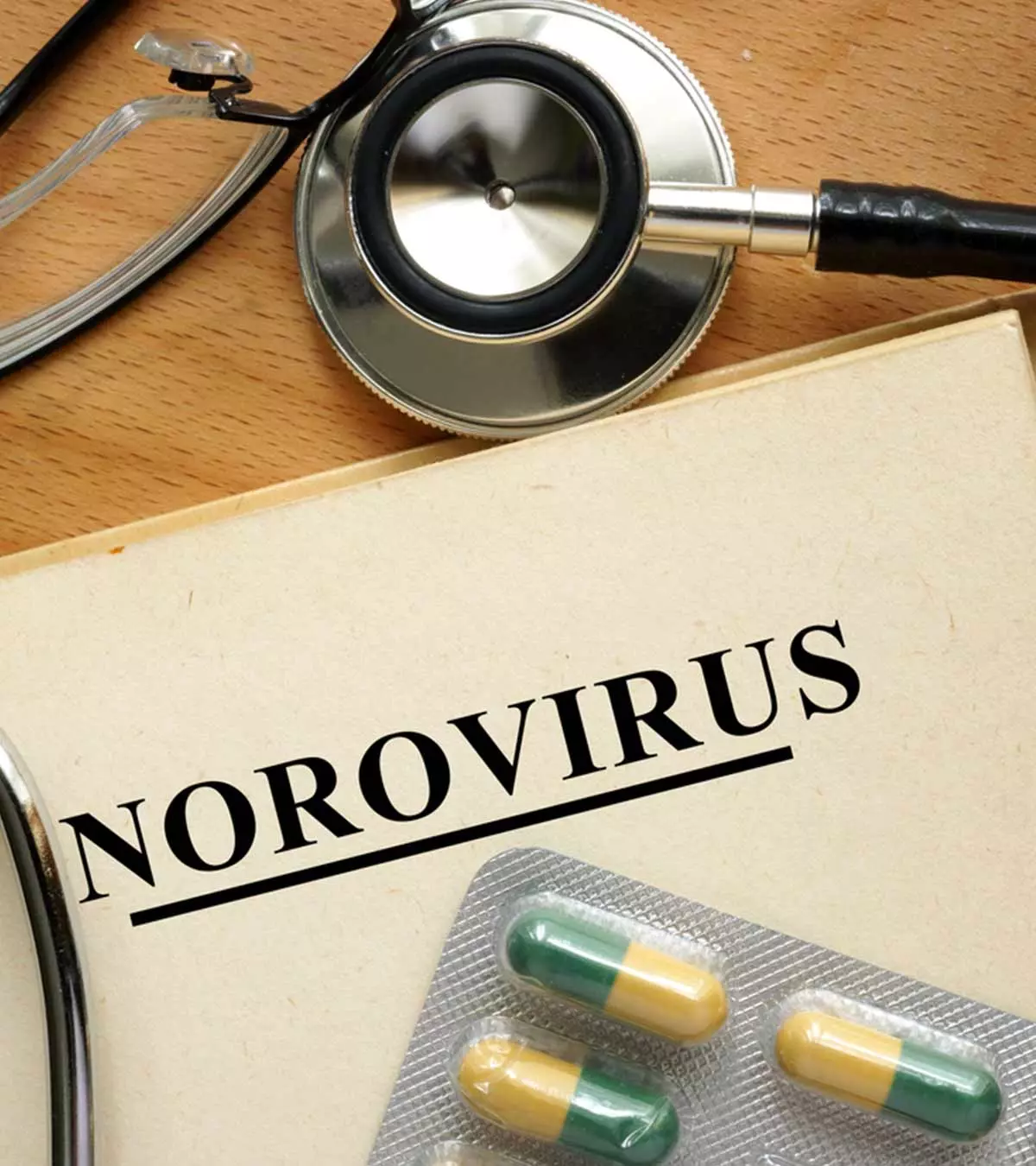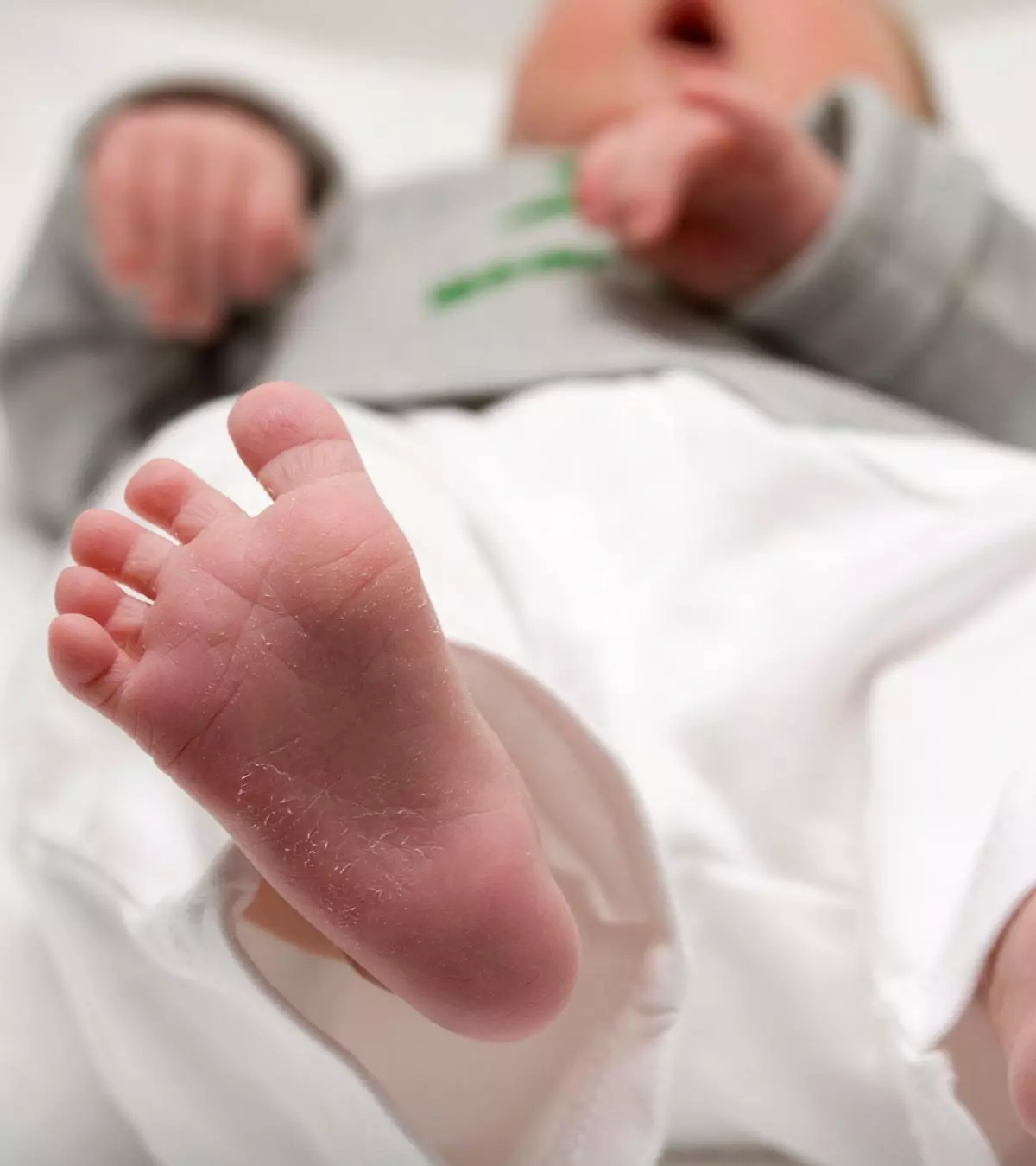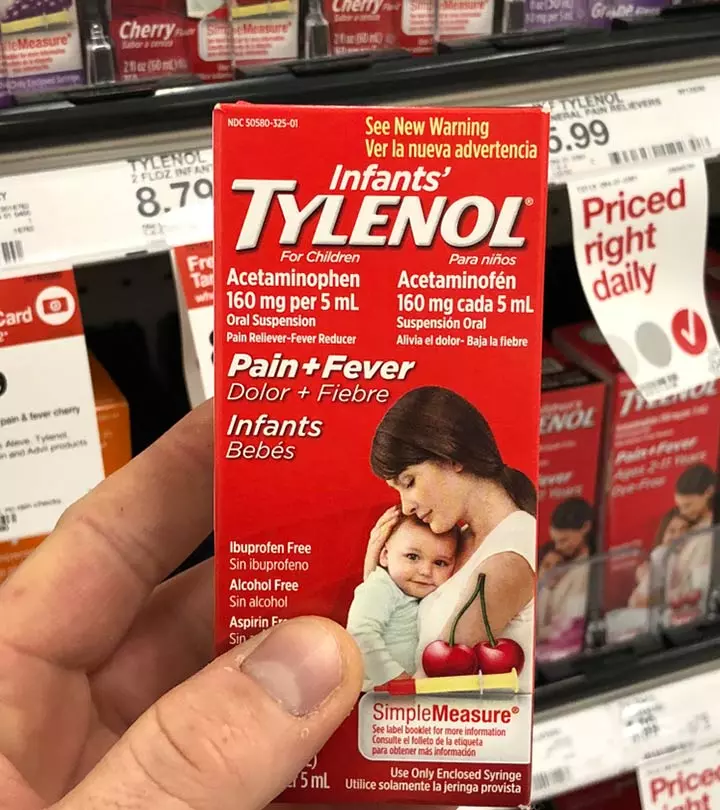
Image: Shutterstock
Knowing the right Tylenol dosing for infants is important to avoid overdose or other side effects. Tylenol is an over-the-counter (OTC) medicine prescribed to babies either as an analgesic (pain-relieving medicine) or an antipyretic (medicine used to treat fever). Infants’ Tylenol should be preferred over Tylenol tablets for babies and young children as the tablets might cause a choking hazard. Therefore, it is advisable to give Tylenol to your baby only under the instruction of your healthcare professional.
Read on to know about the Tylenol dosage instructions for infants, its potential risks, and safe administration techniques
Key Pointers
- The dosage of the anti-fever and over-the-counter Tylenol depends on the infant’s weight.
- For infants, the doctor may suggest this medication in the form of syrup or through a syringe.
- Follow the doctor’s instructions to administer Tylenol to infants safely.
- Watch out for the symptoms of Tylenol overdose, which may include jaundice, nausea, reduced urine frequency, and fatigue.
When To Give Tylenol To A Baby?

The medicine should be administered when the baby has a fever. According to the American Academy of Pediatrics, fever is considered in babies when their body temperature is more than 100.4°F (38°C) (1). This treatment can effectively manage fever by acting as a fever reducer.
According to the manufacturer, Infants’ Tylenol oral liquid suspension can provide pain relief to babies with a sore throat, flu, cold, ear pain, and toothache since the active ingredient acetaminophen also works as a pain reliever (2).
What Is The Infant Dosage Chart For Tylenol?
Experts and the manufacturer of Tylenol recommend that you consult a pediatrician before administering Tylenol to babies or toddlers (3) (4). The dosage could vary depending on your child’s weight, so it is essential to weigh your child accurately to determine the correct dosage. The concentration of acetaminophen in Infants’ Tylenol liquid suspension is at single strength or concentration of 160mg per 5ml.
Below is a table that presents the weight-based dosage recommendations for Tylenol in liquid or syrup form for infants and toddlers (5).
| Weight of the child (lbs) | Liquid (ml) |
|---|---|
| 6 – 11 | 1.25 |
| 12 – 17 | 2.5 |
| 18 – 23 | 3.75 |
| 24 – 35 | 5 |
| 36 – 47 | 7.5 |
| 48 – 59 | 10 |
| 60 – 71 | 12.5 |
| 72 – 95 | 15 |
| 96+ | 20 |
Source: American Academy of Pediatrics
You may repeat the administration every four to six hours or as directed by the doctor. You must not administer more than five doses of Tylenol in a day. Do note that your baby’s doctor may prescribe a dosage different than the one mentioned in the table, and you must stick to the doctor’s advice.
 Things to know
Things to knowHow To Safely Administer Tylenol To A Baby?
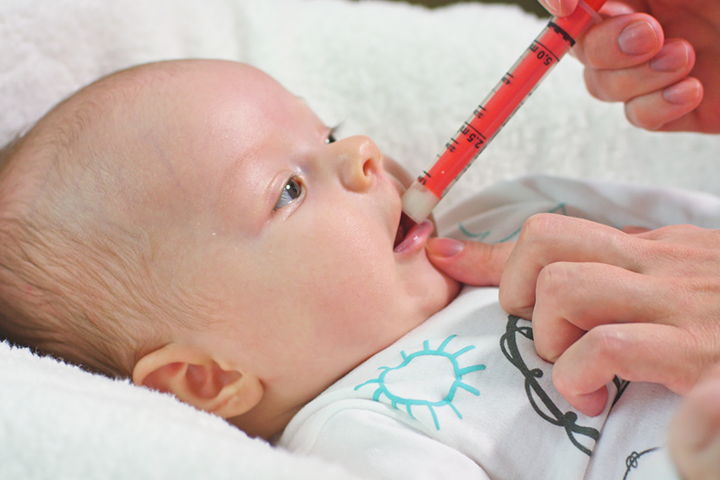
Below are the steps to administer Infants’ Tylenol liquid to a baby or toddler (2).
- Push the plunger and release the air. Insert the syringe’s tip into the bottle opening.
- Turn the bottle and pull the plunger to the required dosage mark to draw the medicine.
- Gently insert the syringe’s tip into the baby’s mouth, directing the tip towards the baby’s inner cheek.
- Press the plunger gently to release the medicine.
You may use the help of your partner or family member to keep the baby’s head still in case they resist it.
To ensure the safe administration of Tylenol in babies, it is essential to take certain safety precautions (4).
- It is vital to use the marked syringe or dropper shipped with the bottle of Infants’ Tylenol to prevent overdose or other errors related to dosage.
- Keep track of the dosage of the medicine and the time it was administered.
- Always pour out the medicine in a well-lit room to avoid discrepancies in the dosing quantity.
- Follow the instructions provided in the label of the medicine regarding the storage of the medicine.
- If your baby is already on any medication, intimate the doctor about it. A combination of acetaminophen and other drugs may cause severe side effects.
- Keep the bottle away from the reach of the baby to avoid accidental ingestion.
 Point to consider
Point to considerWhat Are The Risks Of Administering Tylenol?

Tylenol, in correct doses, is safe for most babies and seldom causes any side effects when administered as per prescription. In rare cases, a baby could be allergic to acetaminophen, causing skin rashes and blisters.
Overdose of Tylenol leads to overdose of acetaminophen, leading to serious side effects. It usually happens if you do not follow the doctor’s prescription or you are not careful while measuring the quantity of the medicine in the syringe.
Minor overdose may most likely not cause any problems or symptoms. The maximum safe dosage for acetaminophen among children is 90mg per kg of the child’s weight per day (6). A dosage beyond this limit may cause the following signs and symptoms (7).
- Nausea
- Pain in the abdomen
- Jaundice
- Reduction in the frequency and amount of urine
- Respiratory problems such as troubled breathing
- Vomiting
- Loss of appetite
- Drowsiness
- Fatigue
Severe overdosing could cause hepatotoxicity and liver damage, which is why it’s important to be mindful of the correct dosage for your baby’s wellness. The tolerance to overdosing could vary from one baby to another. Therefore, if you realize you accidentally overdosed the baby with Tylenol, visit the pediatric care center as soon as possible.
 Be watchful
Be watchfulWhen To See A Doctor?
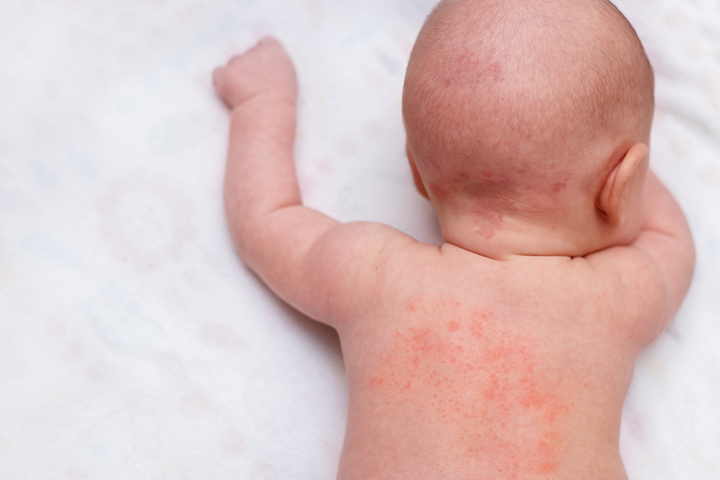
You must see a doctor in the following scenarios (8).
- You overdosed the baby.
- There has been no improvement in the baby’s symptoms within three days since the administration of Tylenol.
- The symptoms worsen after the administration of Tylenol.
- The baby develops skin rashes or blisters after the administration of Tylenol.
Frequently Asked Questions
1. Does Tylenol make babies sleepy?
Tylenol usually does not cause sleepiness in babies when administered in the correct dosage. Some babies in pain or with fever may find relief from symptoms due to Tylenol, causing them to relax and fall asleep. However, overdosing Tylenol/acetaminophen could cause excessive drowsiness and sleepiness as a side effect.
2. How long does Tylenol take to work?
Tylenol or liquid-based acetaminophen could take up to 30 minutes to show effects, although this could vary from one baby to another (9).
3. How often can a teething baby have Tylenol?
Tylenol is an effective medicine that can treat or manage fever in babies. According to experts, infants can be given Tylenol once every four to six hours for pain and fever. Do not give more than four doses in 24 hours. Moreover, do not give any other medicines that may also contain acetaminophen (10).
4. Is it okay to give Tylenol every night for teething?
Giving Tylenol or any other medicine for prolonged durations is not advisable without consulting your child’s doctor. You may give it before bedtime on days when the pain is severe, and the child is irritable.
5. Should infant Tylenol be given with food?
Infant Tylenol can be given with or without food. Follow the dosages carefully using the measuring device and check with the child’s doctor to understand the dosing instructions to avoid serious effects (11).
6. Can I mix infant Tylenol with juice?
Mixing infant Tylenol with juices is not recommended for babies below 12 months (12). You can breastfeed the infants after giving them the medicine to comfort them. For older babies, a few licks of ice pops or some other cold food before giving the medicine can slightly numb the tongue so the babies can tolerate the medicine well (13).
Tylenol, a commonly available over-the-counter (OTC) medication brand of acetaminophen, is safe for babies and toddlers. When used appropriately, Tylenol dosing for infants can help prevent fever and related complications. However, the medication rarely causes side effects such as skin rashes and blisters in babies. However, an overdose of Tylenol may lead to nausea, jaundice, vomiting, loss of appetite, breathing problems, and fatigue. If the symptoms don’t subside within three days of administering Tylenol or the baby develops skin rashes, it is advised to consult your child’s pediatrician for prompt medical intervention.
Infographic: How To Reduce Fever In Babies Through Sponge Bath?
A fever helps fight infection but can cause severe discomfort to babies. Along with rest and adequate fluids, you may also consider a sponge bath to help the baby feel better. The infographic below discusses giving your baby a sponge bath to reduce fever. Illustration: Momjunction Design Team
Illustration: Infant Tylenol: Recommended Dosage And Safety
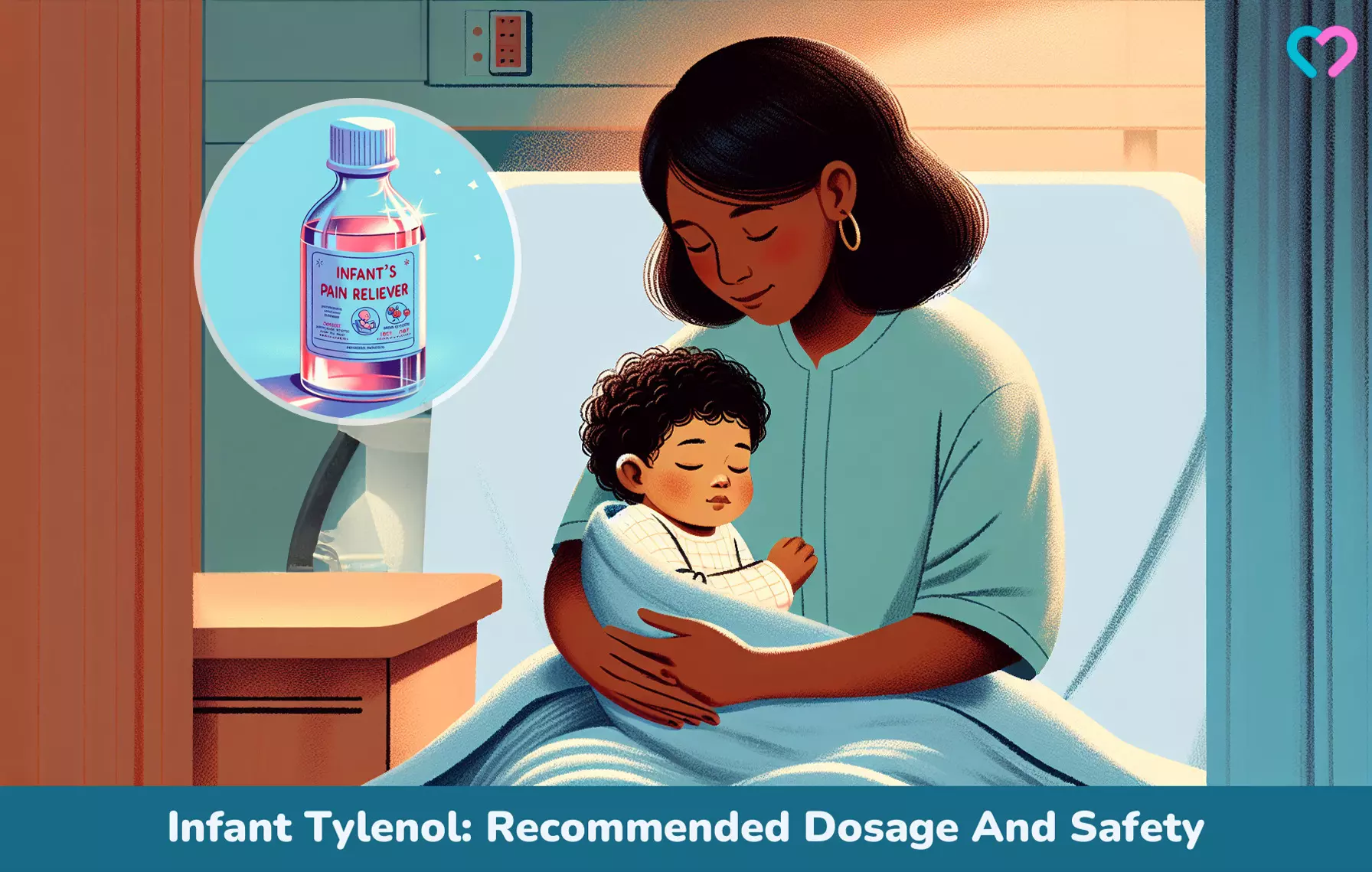
Image: Dall·E/MomJunction Design Team
References
- Signs and Symptoms of Fever.
https://www.healthychildren.org/English/health-issues/conditions/fever/Pages/Signs-and-Symptoms-of-Fever.aspx - Infants\’ Tylenol Liquid Medicine.
https://www.tylenol.com/products/children-infants/infants-tylenol-oral-suspension - Acetaminophen dosing for children.
https://medlineplus.gov/ency/patientinstructions/000783.htm - How To Give Infants A Safe Dose Of Medicine.
https://www.tylenol.ca/children/safety-dosing/how-to-give-infants-medicine - Acetaminophen Dosage Table for Fever and Pain.
https://www.healthychildren.org/English/safety-prevention/at-home/medication-safety/Pages/Acetaminophen-for-Fever-and-Pain.aspx - Acetaminophen Toxicity Symptoms and Treatment.
https://www.chp.edu/our-services/transplant/liver/education/liver-disease-states/acetaminophen-toxicity - Acetaminophen Toxicity in Children and Adolescents.
https://my.clevelandclinic.org/health/diseases/acetaminophen-overdose-toxicity - Acetaminophen.
https://medlineplus.gov/druginfo/meds/a681004.html - Paracetamol for children (including Calpol).
https://www.nhs.uk/medicines/paracetamol-for-children/ - Acetaminophen Dosing Tables for Fever and Pain in Children
https://www.healthychildren.org/English/safety-prevention/at-home/medication-safety/Pages/Acetaminophen-for-Fever-and-Pain.aspx - Tylenol Infants
https://www.drugs.com/cdi/tylenol-infants.html - Fruit Juice in Infants, Children, and Adolescents: Current Recommendations
https://publications.aap.org/pediatrics/article/139/6/e20170967/38754/Fruit-Juice-in-Infants-Children-and-Adolescents?autologincheck=redirected - How to help a child take their medicine
https://health.ucdavis.edu/children/patient-education/How-to-Help-a-Child-take-their-Medicine
Community Experiences
Join the conversation and become a part of our nurturing community! Share your stories, experiences, and insights to connect with fellow parents.
Read full bio of Dr. Supriya Mahajan
Read full bio of Sanjana Bhattacharjee
Read full bio of Rohit Garoo
Read full bio of Vidya Tadapatri











